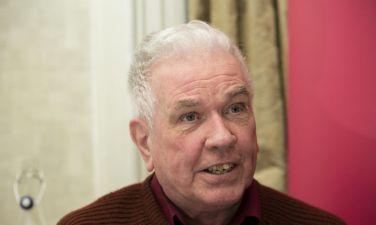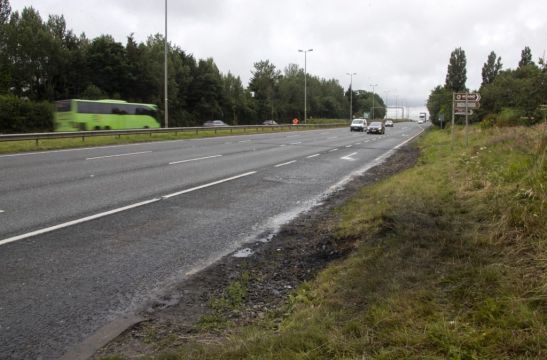The families of three men killed in a collision on the N7 in south Dublin two years ago while fleeing from gardaí have expressed concern at a delay in finding out the result of an investigation by the Garda Síochána Ombudsman Commission (GSOC) into their deaths.
The three victims, who were members of a Tallaght-based burglary gang – Dean Maguire (29), Karl Freeman (26) and Graham Taylor (31) – were killed instantly when their BMW vehicle burst into flames following a head-on crash with a truck between Citywest and Baldonnel on July 7th, 2021, while they were driving on the wrong side of the carriageway.
At a preliminary hearing of the inquest into the deaths of the three men on Wednesday, solicitor for Mr Taylor’s family, James McGuill, said his clients wanted the coroner, Clare Keane, to use her authority to establish why there had been such a delay by GSOC in completing its investigation.
The sitting of Dublin District Coroner’s Court heard that a file on the case by GSOC had been forwarded to the DPP on December 20th last year.
Mr McGuill said his clients wanted to know if GSOC officials had faced difficulties in conducting their inquiry or if the watchdog body had experienced any non-cooperation by An Garda Síochána.
The solicitor said it was a misfortune for the families of the victims that any summary offence that might have been identified by GSOC as having been committed by any garda could no longer be prosecuted because the 18-month deadline for taking such a case would have passed.
“The doors are shutting down on the effectiveness of the GSOC inquiry,” remarked Mr McGuill.
He also pointed out that the ability to bring a civil action against any party from such a case was beyond the means of most individuals “given the level of scientific complexity” relating to the men’s deaths.
Mr McGuill argued the delays in the case by GSOC and the DPP were also impacting on the effectiveness of Dr Keane’s inquest.
He claimed it was possible that “something had happened” in the case given the delay in the DPP making a decision on the GSOC file about which the coroner should be notified.
The solicitor also raised the issue of allowing the legal representatives of the families to have access to a range of different technical reports in the case as well as video footage.
He complained that the families had been left for almost two years with any basic information relating to the deaths of their loved ones.
A solicitor for Mr Maguire’s family, Michael Finucane, said he endorsed all the points raised by Mr McGuill.
Mr Finucane also remarked that he believed GSOC had not been forthcoming with information and assistance about its inquiry.
He claimed the families of the deceased needed at least an explanation for delays in the case by GSOC and the DPP.
“Proper answers are required from the State agencies,” he added.
GSOC’s deputy director of operations, John Leeman, made an application for the inquest to be adjourned under Section 25.1 of the Coroners Act on the basis that criminal proceedings in the case were being considered.
Mr Leeman confirmed that GSOC had forwarded its file on the deaths of the three men to the DPP last December.
Asked by Dr Keane when the DPP might decide on whether any criminal prosecution should follow, Mr Leeman said he hoped to have that answer “within the next few months.”
Addressing relatives of the three men who attended the hearing, Dr Keane acknowledged that waiting for a decision from the DPP was frustrating for them.
The coroner offered them her commitment that she would set another date for mention of the case as soon as she heard back from the DPP.
Dr Keane rejected the request by Mr McGuill that she should allow legal representatives of the families to begin preparatory work for the full inquest by setting a date for them to get material from GSOC “rather than leave matters in the air.”
She explained it was not the usual practice of the coroner’s court to begin such preparatory work in advance of a decision by the DPP, but she stressed that she did not want the families to think she was blocking progress in the case.
Dr Keane said she would await to hear an update from Mr Leeman in a few weeks and would fix a date for another preliminary hearing next month if possible.
Last August, the inquest heard the bodies of the three men had to be identified using DNA samples taken from relatives because of the extent of the injuries they suffered in the collision and subsequent fire.
Controversy was generated following the men’s deaths in 2021 over the conduct of mourners at the requiem mass and burial of Mr Maguire.
The funeral at St Mary’s Priory church in Tallaght garnered international headlines after a screwdriver and torch – tools associated with burglars – were brought to the altar as offertory gifts, while many attendees ignored attempts by local priests to limit the numbers in church and to get the congregation to observe social distancing and mask-wearing as part of Covid-19 restrictions.
One woman who delivered a eulogy said Mr Maguire would not be forgotten before adding: “Sorry for the language, Father – rest in peace, you f**king legend.”

A poster brought to the church read: “RIP Dean – You know the score, get on the floor, don’t be funny, give me the money.”
Fr Donal Roche, who oversaw the requiem ceremony and threatened to halt proceedings at one stage if greater respect was not shown in church, subsequently described it as the “most disturbing” funeral he had ever attended.
A funeral cortege featured motorcyclists doing wheelies and burnouts in a high-speed convoy, while Mr Maguire’s associates also carried out dangerous manoeuvres on public roads around Crumlin and other parts of the city in the days following his death.
All three men, who had a combined total of over 200 convictions, were known to gardaí and were believed to be key figures in a burglary gang that was linked to 'Fat' Andy Connors – a crime gang leader who was shot dead outside his home in Saggart, Co Dublin in August 2014.







